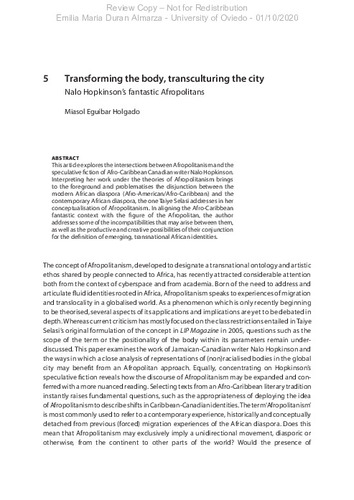Transforming the Body, Transculturing the City: Nalo Hopkinson's Fantastic Afropolitans
Autor(es) y otros:
Editor/Coord./Trad.:
Palabra(s) clave:
Afropolitanism
Diaspora
Transculturation
Speculative Fiction
Fecha de publicación:
Citación:
Descripción física:
Resumen:
This article explores the intersections between Afropolitanism and the speculative fiction of Afro-Caribbean Canadian writer Nalo Hopkinson. Interpreting her work under the theories of Afropolitanism brings to the foreground and problematises the disjunction between the modern African diaspora (Afro-American/Afro-Caribbean) and the contemporary African diaspora, the one Taiye Selasi addresses in her conceptualisation of Afropolitanism. In aligning the Afro-Caribbean fantastic context with the figure of the Afropolitan, the author addresses some of the incompatibilities that may arise between them, as well as the productive and creative possibilities of their conjunction for the definition of emerging, transnational African identities.
This article explores the intersections between Afropolitanism and the speculative fiction of Afro-Caribbean Canadian writer Nalo Hopkinson. Interpreting her work under the theories of Afropolitanism brings to the foreground and problematises the disjunction between the modern African diaspora (Afro-American/Afro-Caribbean) and the contemporary African diaspora, the one Taiye Selasi addresses in her conceptualisation of Afropolitanism. In aligning the Afro-Caribbean fantastic context with the figure of the Afropolitan, the author addresses some of the incompatibilities that may arise between them, as well as the productive and creative possibilities of their conjunction for the definition of emerging, transnational African identities.
ISBN:
Patrocinado por:
Esta investigación ha recibido financiación del Plan Estatal de I+D+i, y se enmarca en el proyecto RTI2018-097186-B-I00 (Strangers and cosmopolitans: alternative worlds in contemporary literatures/Strangers/) financiado por el Ministerio de Ciencia, Innovación y Universidades (MCIU), a la Agencia Estatal de Investigación (AEI) y al Fondo Europeo de Desarrollo Regional (FEDER) [ o la versión corta de (MCIU/AEI/FEDER, UE), del Grupo Intersecciones, financiado por el Principado de Asturias, referencia GRUPIN IDI/2018/000167.
Colecciones
Ficheros en el ítem





